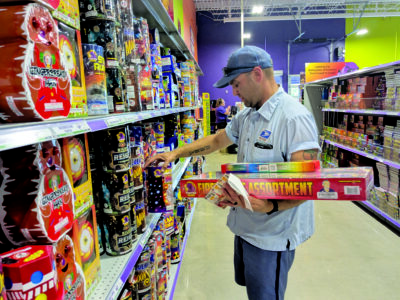Sewer rate increase proposed for Youngstown water customers

YOUNGSTOWN — The administration of Mayor Jamael Tito Brown plans to ask city council to approve a 5% annual wastewater rate increase for four years at its Aug. 28 meeting.
“We don’t have any other option than to increase rates to pay for the long-term control plan” for the city’s wastewater system, said Charles Shasho, deputy director of public works. “We’ll then reassess after the four years are up.”
If approved by council, the rate increase would begin Jan. 1. Since 2021, city wastewater customers have seen their rates increase annually by 4%.
The new rate increase would be used to cover $34.9 million in design work for a “wet weather facility” to reduce combined sewer overflows, and $2.3 million more needed for the design phase of an interceptor sewer to stop wastewater from flowing into Mill Creek Park.
City council agreed in September to use $4.8 million in American Rescue Plan funds to pay for most of the interceptor’s design work.
Council also voted in May to hire a consultant for $3 million for preliminary design work on the wet weather facility, specifically to analyze and develop control measures for a combined sewer overflow at the confluence of Crab Creek and the Mahoning River near downtown.
The money from the rate increase would also go toward the city’s debt for improvement work, Shasho said.
That rate increase wouldn’t include more than $300 million in costs for construction work under a federal improvement mandate at the center of a court dispute.
Based on the analysis, an interceptor sewer to stop wastewater from flowing into Mill Creek Park would cost $87.2 million for construction work, and the wet weather facility would cost $232.6 million, according to a rate report from Arcadis, an international firm that specializes in water and sewer analysis.
“We don’t look at (the rate increase) to generate money for the projects,” Shasho said. “We look at financing large projects and paying the debt over a number of years. We raise rates to pay debt.”
After the four years, Shasho said the city will “reassess the rate. We have to see the projects and the actual costs.”
An average city wastewater customer is charged for the processing of 500 cubic feet of wastewater a month, currently costing $79.09. Under Arcadis’ proposal, that amount would go to $83.05 in January, and to $96.14 by Jan. 1, 2028.
The wet weather facility project is the subject of a court claim filed by Youngstown against the federal government asking that it not be responsible for the entire project. The city objects because of its high cost and the lack of need for such a large amount of work.
Also not included in the possible rate increase is a projected $87.2 million plan to replace 13 overflows that dump wastewater into Mill Creek’s Lake Glacier and Lake Cohasset and build an interceptor.
The city will have a public open house on the Mill Creek interceptor project from 4 to 7 p.m. Wednesday at the Michael Kusalaba Library, 2815 Mahoning Ave.
The city raised sewer rates by 259% since 2001 to pay for the wastewater upgrades as part of a federal consent decree.
RISING PROJECT COSTS
The federal EPA originally had ordered the city in 2002 to do $310 million worth of work, but it was negotiated down to $160 million in 2014 with the expectation it would be finished in 20 years.
The city has tried to get that price down further, but federal authorities have refused.
That led the city to ask U.S. District Court Judge Christopher A. Boyko on March 15 to reconsider the consent decree. The federal government opposes that. The case is still pending in federal court.
Also, the city insists in court filings and interviews that if Youngstown complied with the mandates now, the cost would be more than $380 million – well over twice what it agreed to do 10 years ago.
The first phase was upgrades to the city’s wastewater treatment plant that have been completed. The initial construction estimate was $37.3 million, but city court filings say it cost Youngstown $70 million.
That work helped reduce the sewer overflows that would be part of the wet weather facility project, the city’s court filing states.
The wet weather facility was supposed to be phase two of the work, at a cost of $62 million, and was required to start Feb. 7, 2022. The work hasn’t begun, except the city agreeing in May to spend $3 million on pre-design work.
The city has offered to build a storage bin, which would be smaller and less expensive than a wet weather facility, to hold flow during a storm event and then release it back into the system as one option with another being a less expensive facility at the wastewater treatment plant to provide what it says is the same level of control.
“That project, whatever it is, will address our overflow,” Shasho said.
The federal government has rejected that proposal and last year assessed a $1.47 million penalty on the city, demanding that half – $739,500 – be paid to the federal EPA and allowing the Ohio EPA to demand the other half. The Ohio EPA has declined to seek that penalty.
The interceptor design work was approved March 15, but under the federal decree it was supposed to start July 11, 2020, with construction beginning this past April 5.
Also, that project’s construction was estimated to cost $47.7 million but will now cost $72.5 million, according to the court filing.
The Arcadis study said that project would cost about $87.2 million with $28 million of the cost in 2025, $30.5 million in 2028 and $28.7 million in 2030.
Without a rate increase, the city’s wastewater budget would be out of money by 2029, according to Arcadis.
Have an interesting story? Contact David Skolnick by email at dskolnick@vindy.com. Follow him on X, formerly Twitter, @dskolnick.



